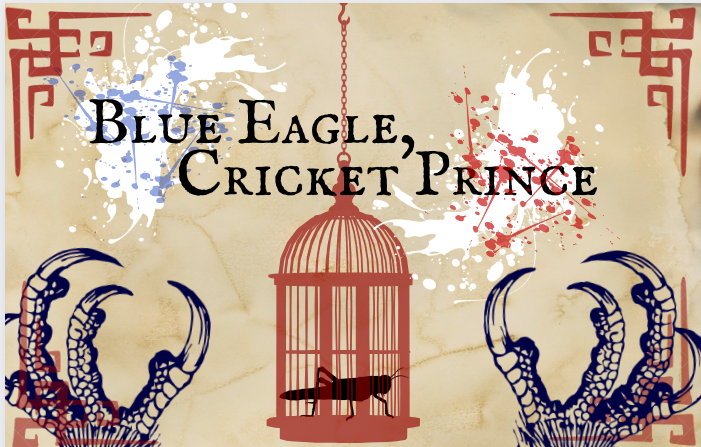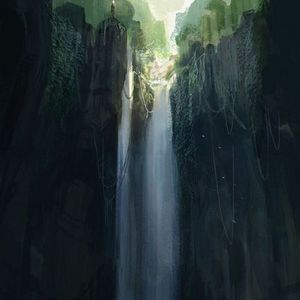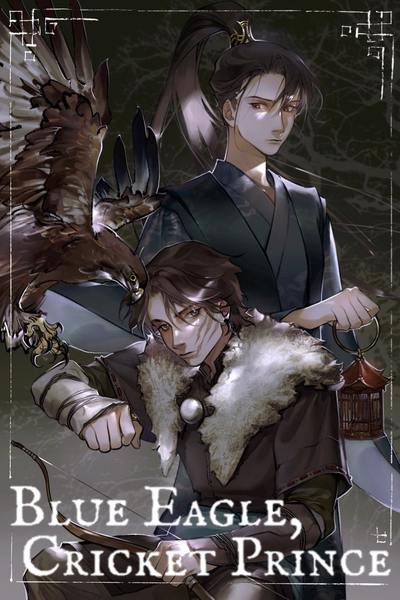Junsai’s gardens had no flowering trees, only maples and gingko, crimson and gold. The pavilion had gilded decoration on its columns, and it was almost as large as the one in the central gardens, also surrounded by the koi pond on all sides but the path to it. One had to pass by its shimmering splendor and then cross a small stone bridge to stand on the veranda outside of his study. The doors were open, and Junsai was seated at the table in the centre of the room, which had walls with built-in shelves. Scrolls and books overflowed, and sunlight came in through windows high above. As soon as Zhisen stepped onto the veranda, Junsai looked up from the scroll he was reading and smiled. “So, did you beat Father again?”
“What do you think?” Zhisen asked, and removed his shoes before stepping inside.
Junsai made a show of deliberating over it, then said, “Obviously you could not let him win and think himself the victor until you come back from the steppe; that is too much time to gloat.”
“Obviously,” Zhisen answered, and sat down across from him. The jewel in his xiao guan was the same as the day before, so he had forgotten to rotate them. “You seem a bit under-the-weather.”
He seemed surprised to hear it. “Do I?” Zhisen chuckled and poured a cup of tea for himself. Junsai gave up on the pretense and sighed. “You know me too well. I was thinking— we sent another four hundred men to the front, but if we have war with the Erdeni, we’ll need to call some of them back. If we do that, and considering that you’ve taken Woqin Province’s men out of the picture for reinforcements, how long will we last if we fight against the Erdeni? How long will it take to win? If we can make an estimate, then we know when we should finish things off with Reidan, whatever the cost of that.”
He noticed that the scroll Junsai had been reading was about reports of Erdeni men that tried to estimate their military force. “I doubt that we can win,” Zhisen said, “but we could probably last for a year or two if the rivers don’t flood and wash any towns away.”
“What strategy should we employ?” Junsai asked, and unrolled another scroll showing a map of the steppe. He pointed at the Taaga mountains. “Cornering them is only possible if we drive them far enough north to avoid the passes through to the Western Kingdoms. But to do that, we would need twenty times the men we have at our disposal now. So it’s not too wise to attempt that and spread our troops too thin. I was thinking that we could let them raid towns on the border and take out their men by ambushing them.”
Zhisen nodded. “That’s a good idea. But the problem is that we don’t have a way of knowing the extent of the damage we’re doing to their numbers. We need to establish some good estimate of their force.”
“I’ve looked through the archives, but there isn’t anything helpful. I asked Xiaobo, too.”
“And he said?”
“Oh, he didn’t say, he just handed me forty scrolls. I’ve been up all night.”
Zhisen drank some tea, considering the map. “We could do as you say— let them raid border towns to catch them. But if we evacuate the towns, the Erdeni won’t be foolish enough to storm an empty town. And if we pile gold in the main square, they’ll know it’s a trap. So, in the end, we would simply have to increase guards and set up proper plans for locking down any of these towns.”
Junsai agreed. “We can arrange that, on a town-by-town basis. Let’s not make room for error.”
“Right, so that is solved— we make the border towns not only defensible but weaponizable. And we should march troops toward the Taaga mountains as well. The Erdeni won’t shy away from battle if they believe that they have the advantage.”
He rubbed his jaw. “From which direction will they come?”
“It doesn’t matter, as long as our men are all equipped with shields and can make the tortoise formation. When the arrows rain down, they’ll be prepared. The Erdeni will be forced to engage in close-range combat, but doing it from astride a horse lets our soldiers fell their steeds. In any case, shields will equalize the battlefield so that it becomes a matter of strength and numbers.”
“But their numbers will be superior if they are aware in advance of our troops.”
Zhisen poured some tea into Junsai’s cup. “So, we must surround our troops with more troops.” To make it more straightforward, Zhisen picked up the troop-representing figurines. He put the blue one in the centre of the steppe. “This is our well-shielded bait.” Junsai nodded, and Zhisen picked up five red troops, putting them around in a circle. “And these are the nomads.” He then took out more blue troops from the small wooden box where Junsai kept them, and encircled the red ones. “Makes sense?”
Junsai looked at it for a moment, then said, “Cavalry, then?”
“Well, to position men near Taaga for a proper encirclement, we need to disguise them as traders with the Western Kingdoms. So, let there be a few horses, and a few carts loaded with arms.”
“And in attempting to rob them, the Erdeni scouts are killed and they can’t get reinforcements back to the bait fast enough,” Junsai concluded. “It’s very clever, but how should the bait signal to the others?”
He considered the matter. “Sound won’t travel far enough. What about f—”
“Fireworks,” Junsai said, at the same time as Zhisen. They laughed, and Junsai added, “Perfect.”
“Except this won’t work twice, so we’ll have to devise another plan for the second battle if there’s war. Which I hope we can avoid, but… well, I’m not all that confident about persuading Chief Tolon.”
Junsai met his eyes and was quiet for a moment. Then, he looked back at their plan, the painted wooden pieces too reminiscent of children’s toys. “Can I persuade you not to risk your neck?”
“No,” Zhisen said. “But, on another subject, have you worked it out with Reidan?”
Looking faintly annoyed that Zhisen was changing the subject so quickly, Junsai pulled out a different map and showed it to him. It was marked with red ink in many places, x’s and circles showing various formations on the battlefield. “We took Taiyi city yesterday, but crossing the river will be a challenge. Their bridges are well-defended, slingshots and all. It would be suicide to march.”
“Is there anything for building boats?”
“The timber of houses in Taiyi. There are trees, but we need them for cover.”
Zhisen clicked his tongue. “What’s the point of conquering a city to tear it down?”
“I know,” Junsai said, and folded his arms, looking irritated. “The river is too deep and wide to cross easily.”
They both thought it over in silence for a while, until an idea came to Zhisen, and he took up Junsai’s calligraphy brush, wetting its tip with ink. He searched for the smallest bridge and circled it, then found their nearest troops and marked the camp with an x. “What’s the distance?”
“Less than three hours.”
“What about this: we send a group of ten or so elite soldiers across the river on a raft. We won’t have to tear down more than a shack for that. These elite soldiers keep to the shoreline to avoid being spotted. Then we make attacks on all of the bridges, at the same time. The Reidan generals won’t know where to concentrate their forces, but if they choose one bridge to focus on, it won’t be the smallest one. So, our elite soldiers— while the others are diverting attention to the bridge— saw the ropes of the catapults not in use. Without siege engines, the advantage goes to whichever side has more men.”
“I’m not sure that we have more.”
“Then, send those four-hundred reinforcements to that bridge before Reidan can count our troops again,” Zhisen said, and Junsai was rolling up the map. “Is there anything else?”
Junsai shook his head. “No, that’s all. I’ll present it to the court tomorrow.” While he tied the scroll with twine, he asked, “By the way, I wondered if there’s another reason you asked for an exemption for the soldiers living in Woqin province. Is there something you’re working on that you need them for?”
Zhisen drank some more tea and smiled. “What, do you mistrust what I said at the council?”
Glancing over his shoulder from where he was replacing a map on the shelf, Junsai said, “Well, you’ve never made that argument about food production before, even though it would always be valid. If you think this war will last especially long, then that’s explanation enough. But you didn’t mention it, so…?”
“So, you’re correct. I plan to undertake a construction project.”
He turned around properly, looking surprised. There was no sign of suspicion in his honey-coloured eyes, unlike when Feiyan and Emperor Xian had asked about his plans before. “What are you building?”
Zhisen waved it off. “It’s a surprise, so don’t interrogate me about it.” Leaning across the table, he picked up a candy from the small bowl near Junsai’s brush, careful to hold his sleeve away from the ink. “I forgot to mention it, but congratulations. I heard you’re expecting a second son?”
“Thank you,” Junsai said, and re-joined him at the table. “Although, I think I could avoid another earful from Father if Shengtong would agree to a child already…”
“Does she not?”
Junsai winced. “Ah, well, you know. She’s still rather upset about her sister…” Zhisen had known for a while that Shengtong’s younger sister had gotten a deep scratch on her face, that it had scarred, and that the family of her betrothed demanded a dowry too great to pay. He would have interjected his opinion on the matter, but Junsai added, “But I suspect there is a more emotional element involved…”
Zhisen laughed. “I’m sure you can persuade her that you’ll love her even if she puts on weight.”
“It’s not like that,” Junsai said, and swatted Zhisen’s hand away from the candy. “I think, she may fear that I’ll have no need for her once she bears a son. Although I’ve said otherwise a thousand times.” He sighed heavily and shook his head. “Well, I’m sure it’ll work out eventually.”
“M-hm,” Zhisen said, and snatched another candy from beneath Junsai’s nose.
He looked up with a combination of annoyance and amusement, then paused while Zhisen crushed it between his molars. “Shouldn’t you be looking a little distraught, brother mine?”
Frowning, Zhisen asked, “Why would I?”
Junsai blinked at him with wide eyes, then let out a dumbfounded bark of laughter. “Zhisen, what’s wrong with you? Even I have heard how often Father tells you to produce an heir of some sort.”
“Oh.”
He seemed lost. “Oh? What do you mean, ‘oh’? Zhisen, you’re almost thirty. So are your women.”
“I could say the same to you and Shengtong— you’re older than me,” Zhisen pointed out, and plucked up another candy before Junsai could grab his wrist. “They are really tasty, by the way.”
“Zhisen, be serious—”
“I’m very serious,” Zhisen said, crunching on the tough caramel.
Junsai was silent for a long time. Zhisen drank some more tea in the meantime, thinking about how he should excuse himself. In a bit of an undertone, Junsai asked, “Is there… something… amiss?”
Zhisen was about to just tell him to stop asking about his sex life unless he was prepared to hear a string of jokes, when there was the sound of footsteps behind him. He recognized the jingle of the spherical bell that Shengtong wore hanging from her sash, and composed himself.
“Oh, Zhisen,” she said, and her voice was like that bell, light and sweet. “Lucky I see you before you depart.” Zhisen glimpsed the tall shadows of her hair ornaments as she swept into the study. “I wanted to tell you to please be careful to keep your head on your shoulders in the steppe. Are the Erdeni not a lot of vicious dogs, who snap their teeth at all the world? You’re far too handsome to come back covered in tooth-marks.”
He smiled in return, inclining his head. “What difference is there, between a wild beast and caged? He would bite all the same. Rather, if he is caged and not starved, he may bite ever-harder.”
Shengtong laughed lightly, amber eyes gleaming. “The solution is to muzzle him.”
Junsai sighed. “Enough with the metaphors. I’d prefer if they truly were dogs, but they’re worse.”
“Oh, don’t be like that, my dear,” Shengtong said, and sat down beside him, neatly arranging her skirts so that they would not become creased. “If not for metaphor, what turn of phrase could more adequately describe the court than a pit of snakes? And you both, better than peas in a pod.”
He raised an eyebrow, turning slightly to face her. “What makes you say that?”
“Scheming over battle plans together, thick as thieves…”
Junsai laughed. “Enough, enough. I get it.”
“And you turtledoves,” Zhisen said, getting to his feet. “I shall leave in peace.”
Shengtong seemed surprised. “Will you not join us for dinner?” Zhisen tried to answer, but she added swiftly, with some amusement, “Or, are you still frightened that I will drink you under the table?”
Junsai shook his head with a smile and drank some more tea. Zhisen thought about what to say in response. I don’t have the time to waste being frightened, he might have said. Or, he might have said, Aren’t you frightened that I may be clever enough to look in the mirror and see what is in front of my nose? But he did not say any of these things. “I’m afraid beyond imagination,” he said, and left while they laughed.













Comments (1)
See all